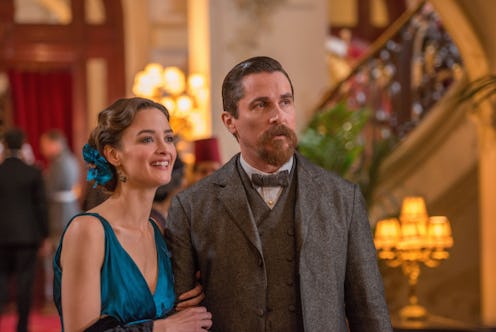
The new film The Promise is a sweeping love story that includes an Odyssey-like adventure, several daring escapes, and a scrappy rebellion that rivals Les Miserables. However, what's most striking about the movie is how The Promise shows the unique purpose of journalists during war time — something that also happens to be the focus of the new documentary Hondros. In order to tell an accurate and affecting story about war and violence, you need the accounts of both observers and survivors, and both Hondros and The Promise powerfully do just that.
The Promise, out now, is set at the end of the Ottoman Empire in 1915 and tells the story of the Armenian Genocide — a tragedy that the Turkish government denies to this day. According to Deadline, this is actually the first mainstream Hollywood film about the Armenian Genocide, and in the film, the audience is taken along for the ride with Oscar Isaac's character Mikael, an Armenian medical student who finds himself fighting for survival and for his family. With him are his love interest Ana, an Armenian woman who grew up overseas is France, and her romantic partner, an Associated Press journalist named Chris Myers (Christian Bale).
The three are involved in a love triangle of sorts, but "fighting over the woman" quickly takes a backseat when the Turkish government begins rounding up Armenian citizens and either imprisoning them, sending them to the front lines, or outright massacring them. This is where Chris comes in; he cares about Ana, but his primary objective is to make sure that people outside of the Ottoman Empire know that these horrors are happening.
While Bale's character is not a real person, people like him did exist at the time. Eyewitness accounts of the Armenian genocide came from writers like Gertrude Bell, as well as American missionaries and ambassadors. Historians must rely on these accounts when the official story is one of denial, and The Promise's portrayal of Chris emphasizes just how important war journalists are in sharing news with the masses.
Reporters are, of course, still integral to global politics today. Take the documentary Hondros, which was screened at this year's Tribeca Film Festival. It tells the story of Chris Hondros, a war photographer who, like the fictional Myers, did not need to be told where to go. He knew how to follow a story. He also, according to accounts in the documentary, never hesitated to step in and help out people in need. The film describes Hondros as someone who sought to "shine a light on places that would otherwise be dark," something that Myers also tries to do in The Promise. The two movies may be set in completely different eras, but both of them similarly emphasize the crucial role that journalists play during wartime.
Which isn't to say that journalists are the only focuses of these films. The Promise is Mikael's story, and deftly avoids framing Myers as a white savior. It would be a shame to tell an Armenian story without any Armenian stories. Mikael, at one point, notes that as an American journalist, Myers is free to go home and write about what's going on, unaffected by it. Even when Myers is arrested, his privilege (and help from others in power, both foreign and domestic) ultimately saves his life. Journalists are integral when it comes to objectively observing and reporting the genocide, but The Promise is ultimately the tale of a survivor. In Hondros as well, the photographers' subjects are interviewed as well as his colleagues, showing just how many accounts are needed to accurately and powerfully tell a story.
Film has the ability to spread awareness and raise issues, whether it's a true story like Hondros or a fictional work based on true events like The Promise. Both movies showcase the often-ignored fact that war journalists are essential, no matter the situation or time period, and it's good to see these important people dramatized on-screen and given the focus they've rightfully earned.